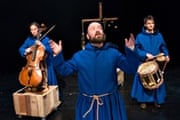A damning of jurors
This collective noun provides a window on to British history. Before the 13th century the old feudal system of justice prevailed, under which anyone accused of a crime could be charged, tried and sentenced by the lord of the manor. When King John signed the Magna Carta in 1215, he enshrined in law the right to a trial by jury. A "damning" verdict was one that found the plaintiff guilty of the crimes they were charged with. The word comes from the old French word dampner, from the Latin damnāre, meaning to injure or condemn, and in the middle ages it implied that your crimes made you worthy of eternal damnation.
An incredulity of cuckolds

Like most collective nouns, this one is 15th century in origin and shows how much of a game the invention of such terms had become by the mid-1400s. The word "cuckold" comes from the habit of the female cuckoo bird putting her eggs into other birds' nests, and can be applied to any male unwittingly raising a rival's offspring. The term sheds light on attitudes towards female sexuality and morality. This group of husbands is incredulous to discover that their wives have been unfaithful to them. It's not a "fury of cuckolds", or "a weeping" or "a shamefulness", they're not in despair – they're either in denial or they're in the dark.
A murder of crows
While most terms for groups of birds are linked to their song or habitat, this one has its roots in medieval folklore. With their dark feathers and jet-black eyes, crows were regarded by 15th-century peasants as messengers of the devil or witches in disguise. They were suspected of having prophetic powers, and the appearance of a crow on the roof of a house was taken as an omen that someone inside would soon die. There are also accounts of the birds living up to their murderous name by enacting something known as a crow parliament (kråkriksdag in Swedish), during which up to 500 birds are said to gather together before suddenly setting on one of their number and tearing it to pieces.
A misbelief of painters
We're talking artists here, rather than decorators, and, in particular, painters of portraits. One aim of medieval portraiture was to present the sitter as they hoped to be remembered after their death. Artists, like poets, were dependent on wealthy patrons for their living, so portrait painters had to strike a balance between truth and flattery. Shoulders could be broadened, eyes brightened, paunches flattened and foreheads heightened. Misbelief meant an erroneous belief, rather than an inability or refusal to believe, so the painter's job was to conjure misbelief in those who viewed his work; to create the illusion of beauty even where he found none.
A parliament of owls

This group name has its origins in the 1950s children's classic The Chronicles of Narnia by CS Lewis and is a reference to Chaucer's allegorical poem "The Parliament of Fowls", in which all the birds of the Earth gather together to find a mate. Lewis adapts the title of Chaucer's poem to describe a council of owls who meet at night to discuss the affairs of Narnia. The huge international success of Lewis's books – they've sold more 100m copies in 47 languages – means that the term has become far more widely known than most of the traditional collective nouns and is now recognised by dictionary compliers as the "correct" term for a group of owls.
A promise of tapsters
"Tapster" is now obsolete but can be translated as barman or barmaid – whoever is in charge of the "tap". The tapster's "promise" is something we're all familiar with: that slight inclination of the chin, subtle nod or lift of the eyebrow that says: "You're next". But can it be trusted? There's never been a better embodiment of a false promise than the tapster's. In As You Like It, Celia and Rosalind make the point perfectly in their discussion about the promises of love with the damning line: "… the oath of a lover is no stronger than the word of a tapster."
A superfluity of nuns

This 15th-century term can be interpreted in two ways, the first is as simple fact: there were around 138 nunneries in England between 1270 and 1536, many of which were severely overcrowded. The convent was seen as a natural step for the daughters of the nobility who had passed marriageable age, and lords often put pressure on prioresses to accept their daughters even if they were already full. Alternatively, the term could have been a reference to the emerging view among agitators for church reform that the days of the monastery and convent were over. Fifty years after this term was recorded in print, Henry VIII had ordered their closure and the Protestant reformation was in full swing.
A bloat of hippopotamuses
This is a comparatively recent addition to the collective noun canon, appearing for the first time in print in CE Hare's 1939 hunting and fishing manual The Language of Field Sports. An average male hippo weighs just under 3,600kg (8,000lb) and their bodies are covered in a layer of subcutaneous fat that helps them to float well. It is likely that they genuinely do spend much of their time with bloated stomachs since their diet is almost exclusively grass, and they can store what they have ingested for up to three weeks.
A lying of pardoners

Medieval society was dominated by the church, and the ticket to heaven was an unsullied soul. In pursuit of spiritual purity, but largely unable to resist the occasional temptation, the desperate populace turned to "pardoners" to cleanse them of their sins. Pardoners were usually friars or priests who claimed to be in close contact with the pope, whom they said gave them the power to grant absolution. For a fee, naturally. Not surprisingly, the profession attracted a large number of fraudsters armed with fake papal pardons and bogus relics. Records held by the Corporation of the City of London dating back to the 15th century reveal several cases of "lying pardoners" being put in the stocks.
A shrewdness of apes
At first glance, it's hard to believe that this collective noun was in use a full 500 years ago. Nowadays, shrewdness means intelligence and, more precisely, astuteness. And though recent studies into the behaviour and brains of apes have revealed startling cognitive abilities, these findings would have shocked medieval naturalists. Instead, our forefathers noted in apes a kind of playful mischievousness, and in their day shrewdness meant wickedness. In a wonderful stroke of luck, the evolution of our language has mirrored the evolution of our scientific understanding, so that a term that made perfect sense in 1486 also makes perfect sense to us.

Comments (…)
Sign in or create your Guardian account to join the discussion